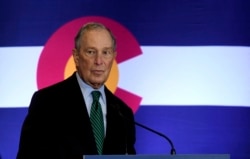Seven U.S. Democratic presidential candidates are debating again Thursday, offering themselves to U.S. voters as an alternative in next year’s election to President Donald Trump, now newly impeached but undaunted in his quest for a second term in the White House.
The one-time Democratic field of more than two dozen candidates has shrunk, as several candidates have dropped out of the chase for the party's nomination.
The seven appearing on the debate stage at Loyola Marymount University in Los Angeles are led by former Vice President Joe Biden, senators Bernie Sanders of Vermont and Elizabeth Warren of Massachusetts, and South Bend, Indiana, Mayor Pete Buttigieg. They all met the party’s minimum requirements for enough voter support in polls and substantial fundraising to make the debate stage.
Three others — Sen. Amy Klobuchar of Minnesota, billionaire activist Tom Steyer, and entrepreneur Andrew Yang — join them. All of the previous debates had at least 10 candidates laying out their positions.
More Democratic candidates who did not qualify for the sixth debate continue to campaign, still hoping to make a connection with voters six weeks before he party's first nominating contests in the midwestern state of Iowa, and later in the northeastern state of New Hampshire.
One wild-card candidate is a late entrant in the Democratic race — Michael Bloomberg, the billionaire publishing magnate and former New York mayor, who is spending his own money on an expensive television advertising campaign to increase his stature in vote-rich California, the largest U.S. state. Democrats will cast ballots there in an early March nominating election.
While support for various candidates still in the field has waxed and waned in national polls, there has been one constant — 77-year-old Biden continues to lead the pack, despite frequent verbal gaffes.
Biden, in his third bid for the Democratic presidential nomination, has touted his electoral chances against Trump. He frequently polls ahead of the president in a hypothetical matchup between the two.
Two other septuagenarians, Sanders, a self-described democratic socialist, and Warren, a former Harvard law professor, also often poll ahead of Trump, as does 37-year-old Buttigieg. But Biden usually fares better against Trump than the other three, while an occasional poll has Trump winning some of the matchups.
The polls perhaps led Trump to assume Biden would be his 2020 opponent, thus singling out the former vice president in his monthslong quest to get Ukraine to investigate him and his son Hunter's work for a Ukrainian natural gas company.
Trump has described the request to Ukrainian President Volodymyr Zelenskiy as “perfect,” but it is at the center of the impeachment case against Trump brought by the Democrat-controlled House of Representatives, which is now heading to the Senate for a trial in January.
Trump remains highly unlikely to be convicted in the Republican-majority Senate and removed from office, but he now is the third U.S. president to be impeached in the nearly two-and-a-half-century history of the United States. All of the Democratic contenders supported Trump’s impeachment.
In previous debates, the Democratic candidates have sparred over the extent to which they would try to change U.S. health care policies if they defeat Trump. Biden has called for incremental changes to the 2010 law approved while he was vice president, which has helped millions of people buy health insurance coverage to pay their medical bills.
Sanders and Warren are pushing for adoption of a government-run insurance program for all Americans, something Biden says would be prohibitively expensive.
Aside from health care, the Democrats are likely to face questions from debate moderators about national security, trade with China and other nations, gun control in the wake of continuing mass shootings in the U.S., race relations, immigration, U.S. relations with long-standing European allies, and contentious dealings with Russia.
Biden could face questions about his son's lucrative employment at the Ukrainian gas company, Burisma, and his own role in helping oust a Ukrainian prosecutor that the U.S. and European allies deemed weak against corruption.






